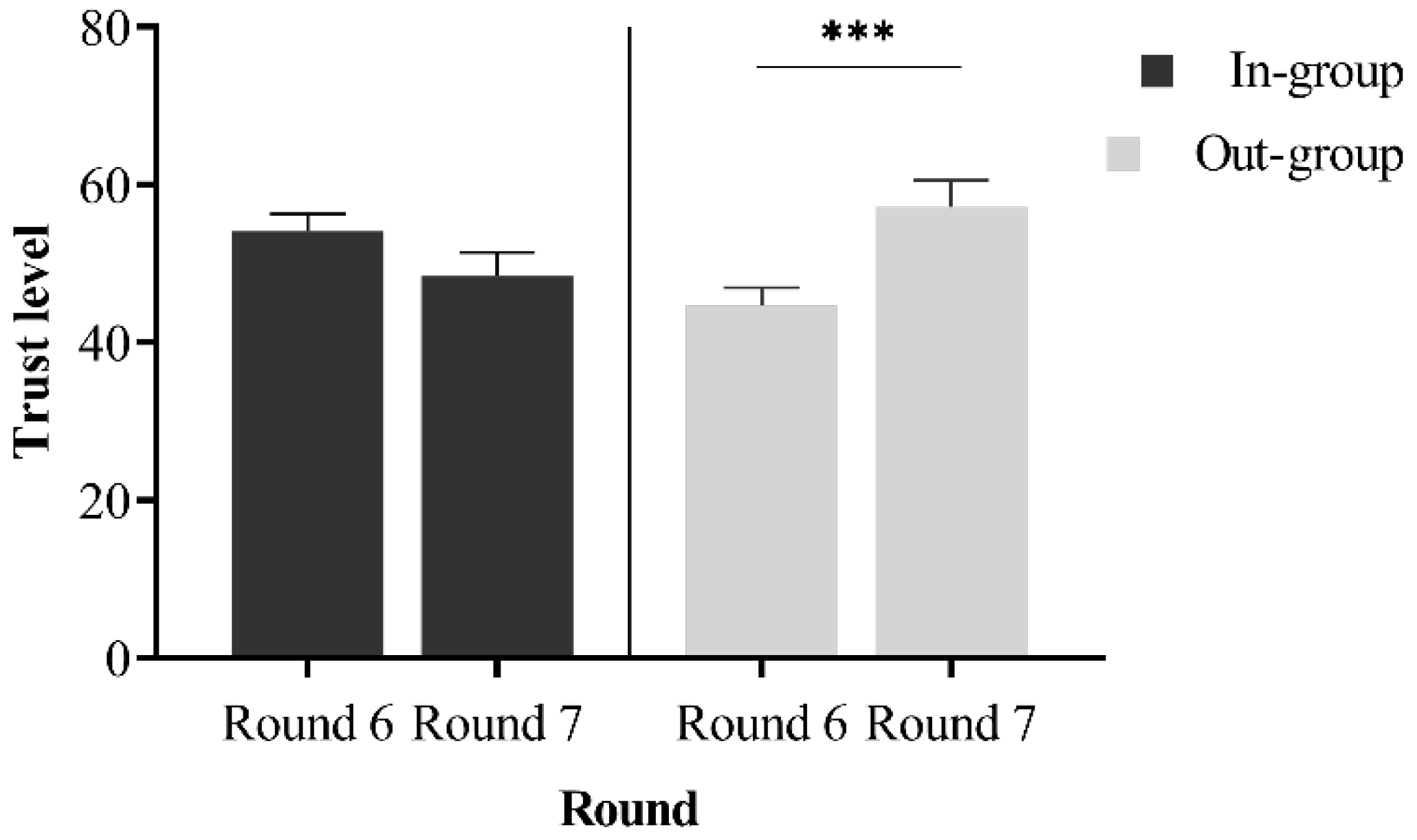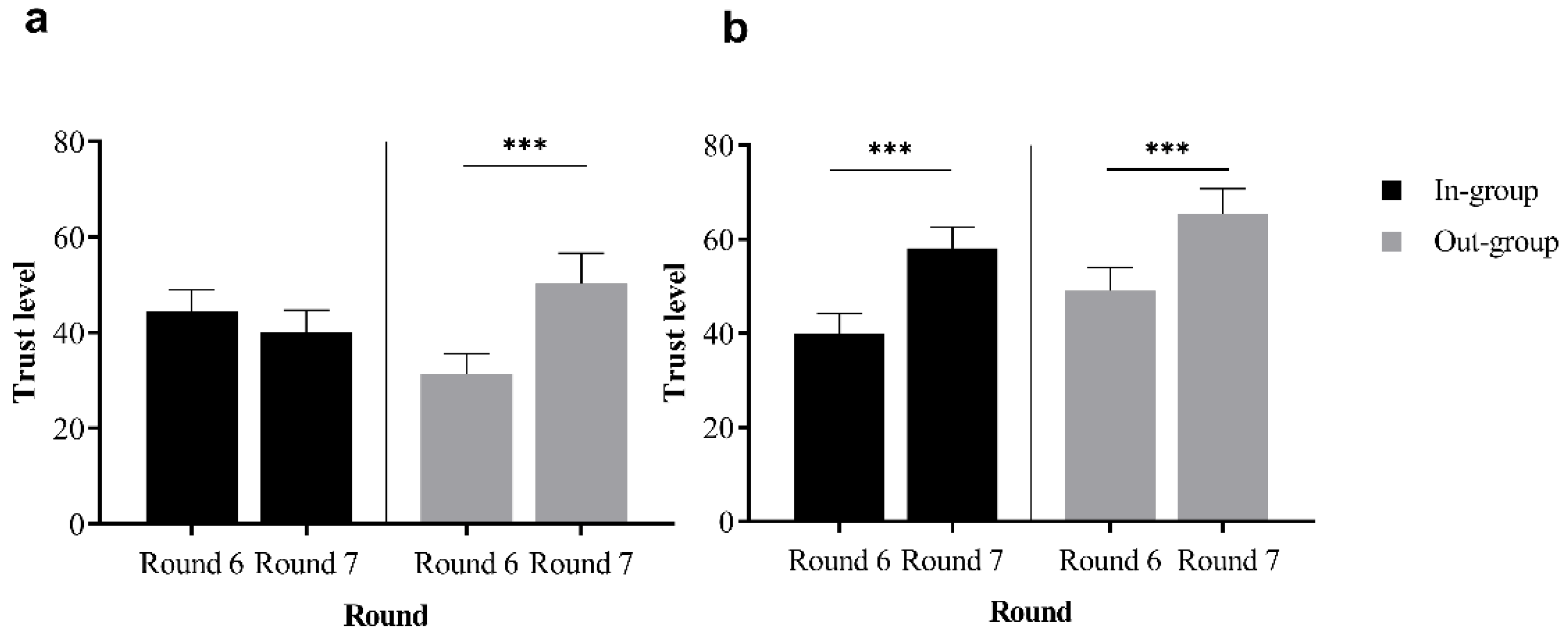Exemplary Self-Discipline, Leniency towards Others: Competitive Contexts Amplify the “Black Sheep Effect” in Restoring Ingroup Trust
Abstract
1. Introduction
2. Study 1
2.1. Method
2.1.1. Participant
2.1.2. Measures
2.1.3. Procedure
2.2. Results
2.2.1. Manipulation Checks of Trust Violation
2.2.2. The Influence of In- and Out-Groups on Trust Repair
3. Study 2
3.1. Method
3.1.1. Participant
3.1.2. Measures and Procedure
3.2. Result
4. Discussion
4.1. The “Black Sheep Effect” in Intergroup Repair Trust
4.2. The Moderating Effects of Cooperation and Competition on Trust Repair in In- and Out-Groups
4.3. Implications and Limitations
5. Conclusions
Author Contributions
Funding
Institutional Review Board Statement
Informed Consent Statement
Data Availability Statement
Conflicts of Interest
References
- Xin, S.; Xin, Z.; Lin, C. Effects of trustors’ social identity complexity on interpersonal and intergroup trust: Social identity complexity and trust. Eur. J. Soc. Psychol. 2016, 46, 428–440. [Google Scholar] [CrossRef]
- Otten, S.; Wentura, D. About the impact of automaticity in the Minimal Group Paradigm: Evidence from affective priming tasks. Eur. J. Soc. Psychol. 1999, 29, 1049–1071. [Google Scholar] [CrossRef]
- Tajfel, H. Social psychology of intergroup relations. Annu. Rev. Psychol. 1982, 33, 1–39. [Google Scholar] [CrossRef]
- Wang, Y.W.; Zhang, Z.; Zhang, W.; Huang, L.; Guo, F.B.; Yuan, S. Group Membership Modulates the Recipient’s Fairness Consideration in Ultimatum Game. Acta Psychol. Sin. 2014, 46, 1850–1859. [Google Scholar] [CrossRef]
- Zhang, Y.R.; Zuo, B. Social identity theory and it’s development. Adv. Psychol. Sci. 2006, 14, 475–480. [Google Scholar]
- Ahmed, A.M. Group identity, social distance and intergroup bias. J. Econ. Psychol. 2007, 28, 324–337. [Google Scholar] [CrossRef]
- Balliet, D.; Wu, J.; De Dreu CK, W. Ingroup favoritism in cooperation: A meta-analysis. Psychol. Bull. 2014, 140, 1556–1581. [Google Scholar] [CrossRef] [PubMed]
- Bernhard, H.; Ernst, F.; Urs, F. Group Affiliation and Altruistic Norm Enforcement. Am. Econ. Rev. 2006, 96, 217–221. [Google Scholar] [CrossRef]
- Liebe, U.; Tutic, A. Status groups and altruistic behaviour in dictator games. Ration. Soc. 2010, 22, 353–380. [Google Scholar] [CrossRef]
- Xin, Z.Q.; Xin, S.F. The Influence of Trustees' Social Identity Complexity on Their Trustworthiness. Acta Psychol. Sin. 2014, 46, 415–426. [Google Scholar] [CrossRef]
- Li, Y.; Liao, Y.; Cheng, Y.; He, J. Group conquers efficacy: Preschoolers’ imitation under conflict between minimal group membership and behavior efficacy. PLoS ONE 2019, 14, e0223101. [Google Scholar] [CrossRef] [PubMed]
- McGuire, L.; Rizzo, M.T.; Killen, M.; Rutland, A. The development of intergroup resource allocation: The role of cooperative and competitive in-group norms. Dev. Psychol. 2018, 54, 1499–1506. [Google Scholar] [CrossRef] [PubMed]
- McLeish, K.N.; Oxoby, R.J. Social interactions and the salience of social identity. J. Econ. Psychol. 2011, 32, 172–178. [Google Scholar] [CrossRef]
- Dai, L.L. Influencing Factors and Their Motivation for Children Aged 5–8 Years to Severely Punish in-Group Violators; Jiangxi Normal University: Nanchang, China, 2023. [Google Scholar]
- McGuire, L.; Jefferys, E.; Rutland, A. Children’s evaluations of deviant peers in the context of science and technology: The role of gender group norms and status. J. Exp. Child Psychol. 2020, 195, 104845. [Google Scholar] [CrossRef]
- Rullo, M.; Presaghi, F.; Livi, S. Reactions to Ingroup and Outgroup Deviants: An Experimental Group Paradigm for Black Sheep Effect. PLoS ONE 2015, 10, e0125605. [Google Scholar] [CrossRef]
- Wu, Z.; Gao, X. Preschoolers’ group bias in punishing selfishness in the Ultimatum Game. J. Exp. Child Psychol. 2018, 166, 280–292. [Google Scholar] [CrossRef] [PubMed]
- Yudkin, D.A.; Van Bavel, J.J.; Rhodes, M. Young children police group members at personal cost. J. Exp. Psychol. Gen. 2020, 149, 182–191. [Google Scholar] [CrossRef] [PubMed]
- Fulmer, A.; Gelfand, M.J. At what level (and in whom) we trust: Trust across multiple organizational levels. Soc. Sci. Electron. Publ. 2012, 38, 1167–1230. [Google Scholar] [CrossRef]
- Zhou, Y. The Influence of Group Identity on the Disruption and Restoration of Trust of First Grade and College Students; Tianjin Normal University: Tianjin, China, 2018. [Google Scholar]
- Zheng, Z.; Qi, C.H.; Wang, Y.; Zhao, H.; Wang, X.X.; Gao, X.L. In-group favoritism or the black sheep effect? Group bias of fairness norm enforcement during economic games. Adv. Psychol. Sci. 2020, 28, 329–339. [Google Scholar] [CrossRef]
- Choi, J.K.; Bowles, S. The coevolution of parochial altruism and war. Science 2007, 318, 636–640. [Google Scholar] [CrossRef] [PubMed]
- McAuliffe, K.; Dunham, Y. Group bias in cooperative norm enforcement. Philos. Trans. R. Soc. London. Ser. B Biol. Sci. 2016, 371, 20150073. [Google Scholar] [CrossRef] [PubMed]
- Birkinshaw, J. Strategies for managing internal competition. Calif. Manag. Rev. 2002, 44, 21–38. [Google Scholar] [CrossRef]
- Barker, J.L.; Barclay, P.; Kern Reeve, H. Within-group competition reduces cooperation and payoffs in human groups. Behav. Ecol. 2012, 23, 735–741. [Google Scholar] [CrossRef]
- Liu, G.; Lin, C.; Xin, Z. The Effects of Within- and Between-Group Competition on Trust and Trustworthiness among Acquaintances. PLoS ONE 2014, 9, e103074. [Google Scholar] [CrossRef] [PubMed][Green Version]
- Abrams, D.; Van de Vyver, J.; Pelletier, J.; Cameron, L. Children’s prosocial behavioural intentions towards outgroup members. Br. J. Dev. Psychol. 2015, 33, 277–294. [Google Scholar] [CrossRef] [PubMed]
- Baron, A.S.; Dunham, Y. Representing ‘Us’ and ‘Them’: Building Blocks of Intergroup Cognition. J. Cogn. Dev. 2015, 16, 780–801. [Google Scholar] [CrossRef]
- McGuire, L.; Manstead AS, R.; Rutland, A. Group norms, intergroup resource allocation, and social reasoning among children and adolescents. Dev. Psychol. 2017, 53, 2333–2339. [Google Scholar] [CrossRef] [PubMed]
- Netzer, L.; Van Kleef, G.A.; Tamir, M. Interpersonal instrumental emotion regulation. J. Exp. Soc. Psychol. 2015, 59, 124–135. [Google Scholar] [CrossRef]
- Brewer, M.B. In-group bias in the minimal intergroup situation: A cognitive-motivational analysis. Psychol. Bull. 1979, 86, 307–324. [Google Scholar] [CrossRef]
- Burnham, T.; McCabe, K.; Smith, V.L. Friend-or-foe intentionality priming in an extensive from trust game. J. Econ. Behav. Organ. 2000, 43, 57–73. [Google Scholar] [CrossRef]
- Berg, J.; Dickhaut, J.; McCabe, K. Trust, reciprocity, and social history. Games Econ. Behav. 1995, 10, 122–142. [Google Scholar] [CrossRef]
- Frazier, M.L.; Johnson, P.D.; Fainshmidt, S. Development and validation of a propensity to trust scale. J. Trust Res. 2013, 3, 76–97. [Google Scholar] [CrossRef]
- Berry, J.W.; Worthington, E.L., Jr. Forgivingness, relationship quality, stress while imagining relationship events, and physical and mental health. J. Couns. Psychol. 2001, 48, 447–455. [Google Scholar] [CrossRef]
- Durrheim, K.; Quayle, M.; Tredoux, C.G.; Titlestad, K.; Tooke, L. Investigating the evolution of ingroup favoritism using a minimal group interaction paradigm: The effects of inter- and intragroup interdependence. PLoS ONE 2016, 11, e0165974. [Google Scholar] [CrossRef] [PubMed]
- Balliet, D.; Van Lange, P.A.M. Trust, conflict, and cooperation: A meta-analysis. Psychol. Bull. 2013, 139, 1090–1112. [Google Scholar] [CrossRef] [PubMed]
- Brewer, M.B. The psychology of prejudice: Ingroup love and outgroup hate? J. Soc. Issues 1999, 55, 429–444. [Google Scholar] [CrossRef]
- Hewig, J.; Kretschmer, N.; Trippe, R.H.; Hecht, H.; Coles MG, H.; Holroyd, C.B.; Miltner WH, R. Why humans deviate from rational choice. Psychophysiology 2011, 48, 507–514. [Google Scholar] [CrossRef] [PubMed]
- Bernhard, H.; Fischbacher, U.; Fehr, E. Parochial altruism in humans. Nature 2006, 442, 912–915. [Google Scholar] [CrossRef] [PubMed]
- Shinada, M.; Yamagishi, T.; Ohmura, Y. False friends are worse than bitter enemies: “Altruistic” punishment of in-group members. Evol. Hum. Behav. 2004, 25, 379–393. [Google Scholar] [CrossRef]
- Lozada, M.; D’Adamo, P.; Carro, N. Plasticity of altruistic behavior in children. J. Moral Educ. 2014, 43, 75–88. [Google Scholar] [CrossRef]
- Han, Z.H. The Influencing Factors and Mechanism of Interpersonal Trust; Nankai University: Tianjin, China, 2010. [Google Scholar]
- Ellemers, N.; Van Rijswijk, W.; Roefs, M.; Simons, C. Bias in intergroup perceptions: Balancing group identity with social reality. Personal. Soc. Psychol. Bull. 1997, 23, 186–198. [Google Scholar] [CrossRef]
- Hewstone, M.; Rubin, M.; Willis, H. Intergroup bias. Annu. Rev. Psychol. 2002, 53, 575–604. [Google Scholar] [CrossRef] [PubMed]
- Otten, S. The Minimal Group Paradigm and its maximal impact in research on social categorization. Curr. Opin. Psychol. 2016, 11, 85–89. [Google Scholar] [CrossRef]


Disclaimer/Publisher’s Note: The statements, opinions and data contained in all publications are solely those of the individual author(s) and contributor(s) and not of MDPI and/or the editor(s). MDPI and/or the editor(s) disclaim responsibility for any injury to people or property resulting from any ideas, methods, instructions or products referred to in the content. |
© 2024 by the authors. Licensee MDPI, Basel, Switzerland. This article is an open access article distributed under the terms and conditions of the Creative Commons Attribution (CC BY) license (https://creativecommons.org/licenses/by/4.0/).
Share and Cite
Cao, N.; Miao, R.; Sun, B.; Ren, Z.; Yue, G. Exemplary Self-Discipline, Leniency towards Others: Competitive Contexts Amplify the “Black Sheep Effect” in Restoring Ingroup Trust. Behav. Sci. 2024, 14, 519. https://doi.org/10.3390/bs14070519
Cao N, Miao R, Sun B, Ren Z, Yue G. Exemplary Self-Discipline, Leniency towards Others: Competitive Contexts Amplify the “Black Sheep Effect” in Restoring Ingroup Trust. Behavioral Sciences. 2024; 14(7):519. https://doi.org/10.3390/bs14070519
Chicago/Turabian StyleCao, Ningmeng, Runrun Miao, Binghai Sun, Zirong Ren, and Guoan Yue. 2024. "Exemplary Self-Discipline, Leniency towards Others: Competitive Contexts Amplify the “Black Sheep Effect” in Restoring Ingroup Trust" Behavioral Sciences 14, no. 7: 519. https://doi.org/10.3390/bs14070519
APA StyleCao, N., Miao, R., Sun, B., Ren, Z., & Yue, G. (2024). Exemplary Self-Discipline, Leniency towards Others: Competitive Contexts Amplify the “Black Sheep Effect” in Restoring Ingroup Trust. Behavioral Sciences, 14(7), 519. https://doi.org/10.3390/bs14070519




